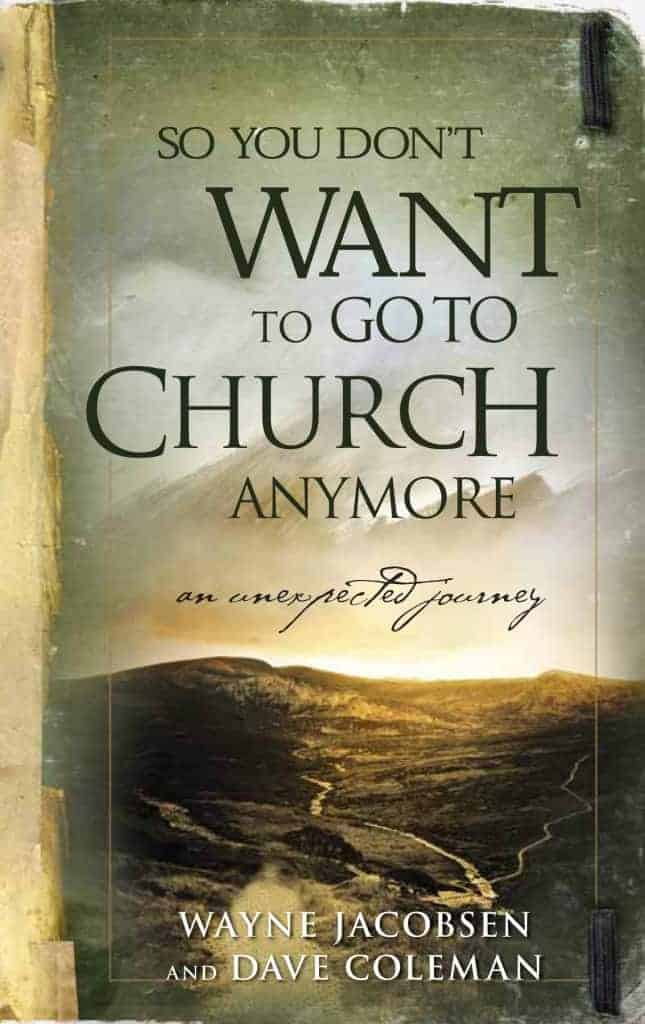The Language of Community
By Wayne Jacobsen & Dave Coleman
BodyLife • September 2006
I’m currently reading So You Don’t Want to Go to Church Anymore into audio files for a soon-to-be-released CD. [Edit: We have finished the audio book. You can find more information here.] It has been fun to re-visit the language that has been such a part of my own journey. One of the things Dave and I wanted to accomplish in the Jake story was to let John be an example of what it means to disciple someone. He never tells Jake what to do and never pushes him.
He simply asks questions and makes observations that relate to the circumstances and issues Jake is facing at the moment. We put into his mouth the most encouraging and enlightening statements we’ve ever heard from others or discovered ourselves. Since we decided against highlighting them in the book in any way, I thought it might be helpful to make a collection of them here as examples of the kind of things we can say that builds others up in the life and freedom of Jesus. Enjoy!
“God’s plan of redemption from the days of creation to the day of the Second Coming was designed to bring people into the relationship of love that the Father, Son and Spirit have shared for eternity. He wants nothing less – or nothing else!”
“This is no distant God who sent his Son with a list of rules to follow or rituals to practice. His mission was to invite us into his love – into a relationship with his Father that he described as friendship.”
“The fact that you don’t feel him holding you doesn’t change the fact that he still is.”
Transformed by His Love
“Walking toward him is walking away from sin. The better you know him the freer from it you will be. But you can’t walk away from sin, not in your own strength! Everything he wants to do in you will get done as you learn to live in his love. Every act of sin results from your mistrust of his love and intentions for you. We sin to fill up broken places, to try to fight for what we think is best for us, or by reacting to our guilt and shame. Once you discover how much he loves you all that changes. As you grow in trusting him, you will find yourself increasingly free from sin.”
“Isn’t it sad that we thought we could press people into spiritual change, instead of helping them grow to trust Father more and find him changing them? You can’t press a caterpillar into a butterfly mold and make it fly. It has to be transformed from the inside.”
Growing Trust
“The church Jesus is building transcends every human approach we’ve tried to use to replicate or contain it.”
“If we could control God, he’d turn out like us. Wouldn’t it be better to let him have his way with us so we become like him?”
“God will provide for you. He always has, except you don’t know that. The fact that you don’t have insurance or a job to lean on doesn’t mean he will forsake you. The fact that others are destroying your reputation doesn’t mean they’ll have the final say. God is not a fairy godmother who waves his magic wand to keep you happy. You won’t get far if you question his love for you whenever he doesn’t meet your expectations. He’s your Father. He knows far better what you need than you know yourself. He is a far better provider for you and your family than you yet know. He is bringing you into his life and rather than saving you out of these things he has chosen to use them to show you what true freedom and life really are.”
“When you can trust his love in each moment, you’ll really know how to live free.”
“So much of what we do is driven by our anxiety that God is not working on our behalf, that we have no idea of the actions that trust produces. Trusting doesn’t make you a couch potato. As you follow him you’ll find yourself doing more than you’ve ever done, but it won’t be the frantic activity of a desperate person, it will be the simple obedience of a loved child.”
“It’s much easier for us to find his will when we live contentedly in God’s provision rather than being anxious for what we don’t see.”
“If we don’t learn to trust, we will only interpret every event from our own self-centered vantage point, which is invariably negative and undermines our relationship with God.”
“That’s how God wins your trust. He’s not asking you to do something despite all evidence to the contrary. He’s asking you to follow him as you see him unfolding his will in you. As you do that, you’ll find that his words and his ways will hold more certainty for you than your best plans or wisdom.”
“Increasing trust is the fruit of a growing relationship. The more you know him and his ways the freer you’ll be to live beyond the influences that tie you down to your own flawed wisdom.”
“You had this incredible hunger to know God and follow him. But you also wanted to be circumstantially secure and well-liked. Those just aren’t compatible with following him. We are safe because he is with us not because our circumstances are easy and trying to get everyone to like you only made you less a person than God made you to be. When you started following what God put in your heart, the other kingdom had to collapse. It was inevitable if not enviable.
“I’m learning the joy of resting in him, doing what I know to do and not doing what I don’t know to do. It’s been one of the hardest lessons to learn, but also the most freeing.”
Misunderstandings
“When are you going to get past the mistaken notion that Christianity is about ethics?”
“We’re just not bright enough to control the ways in which God works.”
“Discipline holds great value when your eye is on the treasure. But as a substitute for that treasure, obligation can be a real detriment when it gives you satisfaction just for completing a task.”
“It’s not about teaching; it’s about living. Learn to live this life and you’ll find no end of folks to share it with. Teach it first, however, and that will be your substitute for living it.”
“Every time people see God moving, someone has to build a building or start a movement. Peter was that way at the Transfiguration. When He couldn’t think of anything else to do, he proposed a building program. If you’re going to walk this way, you’ve got to find freedom from the overestimation of your own capabilities.”
Living For the Approval of Others
“You’re so busy seeking everyone’s approval around you, that you don’t realize you already have his.”
“He’ll make the choice clear to you if you don’t complicate it with any attempts to protect yourself – not to keep your job, not to be liked by others, not ev
“As long as you need other people to approve of what you’re doing, you are owned by anyone willing to lie about you.”
“It’s a lot easier for you to get out of the system than it is to get the system out of you. You can play the game from inside or outside. The approval you felt then came from the same source as the shame you feel now. That’s why it hurts so much when you hear the rumors or watch old friends turn away embarrassed. They’re not bad people just brothers and sisters lost in something that is not as godly as they think it is.”
“You can’t love what you’re competing against and if you’re keeping score you can be sure you’re competing.”
The Illusion of Religious Systems
“We are so quickly captured by a work-driven religious culture that it devours the very love it seeks to sustain.”
“That’s the problem with institutions isn’t it? The institution provides something more important than simply loving each other in the same way we’ve been loved. Once you build an institution together you have to protect it and its assets to be good stewards. It confuses everything. Even love gets redefined as that which protects the institution and unloving as that which does not. It will turn some of the nicest people in the world into raging maniacs and they never stop to think that all the name-calling and accusations are the opposite of love.”
“…If you do what we want, we reward you. If not we punish you. It doesn’t turn out to be about love at all. We give our affection only to those who serve our interests and withhold it from those who do not.”
“The problem with church as you know it, is that it has become nothing more than mutual accommodation of self-need. Some need to lead. Some need to be led. Some want to teach, others are happy to be the audience. Rather than become an authentic demonstration of God’s life and love in the world, it ends up being a group of people who have to protect their turf. What you’re seeing is less of God’s life than people’s insecurities that cling to those things they think will best serve their needs…
“Religion survives by telling us we need to fall in line or some horrible fate will befall us.”
“Institutionalism breeds task-based friendships. As long as you’re on the same task together, you can be friends. When you’re not, people have to treat you like damaged goods.”
“Any human system will eventually dehumanize the very people it seeks to serve and those it dehumanizes the most are those who think they lead it. But not everyone in a system is given over to the priorities of that system. Many walk inside it without being given over to it. They live in Father’s life and graciously help others as he gives them opportunity.”
“The groupthink that results from believers who act together out of their fears rather than their trust in Father, will lead to even more disastrous results. They’ll mistake their own agenda for God’s wisdom. Because they draw their affirmation from others they’ll never stop to question it, even when the hurtful consequences of their actions become obvious.”
“I want to expose the system of religious obligation in whatever ways it holds people captive, but that’s not the same as being against the institution. Don’t let the system threaten you. As long as you react to it, it still controls you.”
“Jesus didn’t leave us with a system he left us with his Spirit – a guide instead of a map. Principles alone will not satisfy your hunger. That’s why systems always promise a future revival that never comes. They cannot produce community because they are designed to keep people apart.”
“I’m convinced that most Christian meetings give people enough of God’s things to inoculate them against the reality of his presence.”
“Religion is a shame-management system, often with the best of intentions and always with the worst of results.”
“Who would choose to be raised in an orphanage? Our hearts hunger for family. That’s where children learn who they are and how they fit into the world. Institutions are like orphanages revolving around the convenience of the staff. You survive best in it by following its rules, but that’s not how Jesus connects you with his Father. For that you need a family and brothers and sisters who can respond to you in the moment, not wait for a meeting or to schedule a seminar.”
“Not all structure is wrong. Simple structures that facilitate sharing his life together can be incredibly positive. The problem comes when structures take on a life of their own and provide a substitute for our dependence upon Jesus. When Jesus ceases to be the object of our pursuit, our touch with his body will fade into emptiness.”
Finding Real Church Life
“You have yet to see what body life can be when people are growing to trust God, instead of living together in fear.”
“Scripture doesn’t use the language of need when talking about the vital connection God establishes between believers. Our dependency is in Jesus alone! He’s the one we need. He’s the one we follow. He’s the one God wants us to trust and rely on for everything. When we put the body of Christ in that place, we make an idol of it.”
“We share body life together, not because we have to, but because we get to. Anyone who belongs to God will embrace the life he wants his children to share together. And that life isn’t fighting over control of the institution, but simply helping each other learn to live deeply in him.
“Any friendship that demands that you lie to save it probably isn’t a friendship at all.”
“If you really want to learn how to share Jesus’ life together, it would be easier to think of that less as a meeting you attend and more as a family you love.”
“The Scriptures tell us very little about how the early church met. It tells us volumes about how they shared his life together. They didn’t see the church as a meeting or an institution, but as a family living under Father.”
“Body life is not something we can create. It is a gift that Father gives as people grow in his life. Body life isn’t rocket science. It is the easiest thing in the world when people are walking with him. You get within twenty feet of someone else on that journey and you’ll find fellowship easy and fruitful.”
“No church model will produce God’s life in you. It works the other way around. Our life in God, shared together, expresses itself as the church. It is the overflow of his life in us. You can tinker with church principles forever and still miss out on what it means to live deeply in Father’s love and share it with others.”
“People who are growing in their relationship with Father will hunger for real connections with his family. He is the God of community. That’s his nature, and knowing him draws us into that community, not only with God himself, but also with others who know him. It is not our obligation. It’s his gift.”
“It’s valuable for the body of Christ to find each other and share his life together. Where people are doing that they won’t need commitment. They’ll bend over backwards to be with each other. Where they aren’t doing that, it does little good just to be committed to a meeting.”
“Sometimes that life is best expressed in a conversation like this. Sometimes it’s best expressed in a larger conversation that a meeting might facilitate. When you can only see it one way, you miss so many other of the ways in which Father works.
“Equip people to live in him first; then you’ll see how he brings his body together. I love it when a group of Christians want to intentionally walk together as an expression of community – listening to God together, sharing their lives and resources, encouraging and caring for each other and doing whatever else God might ask them to do. But you can’t organize that with people who aren’t ready. Discipleship always comes before community. When you learn to follow Jesus yourself and help some others to do the same, you’ll find body life springing up all around you.”
“Obligations are only necessary when the experience is ineffective or lifeless. When people are living in the life of Jesus, they will treasure every opportunity to connect with other brothers and sisters who are also on this journey. It will not be something they have to do, but something they wouldn’t ever want to live without.”
“Jesus is always gathering his flock to himself. People from all over the world are finding their hunger for him eclipsing their hunger for anything else and that every substitute they try only adds to their restlessness. As they keep their eye on him, not only do they grow closer to him with each passing day, but they will find themselves alongside others who are headed that way, too… That’s why you only hurt yourself when you look for people who want to meet a certain way or think like you do. Every person who crosses your path, be they believer or unbeliever, in an institution like this or outside of it, is a potential partner in this journey. By loving all of them to the degree that they allow, you’ll participate in his great gathering.”
Helping Others
“Follow him, even when it creates conflict. Always be gentle and gracious to everyone, but never compromise what is in your heart just to get along.”
“If you tell someone the truth before they’re ready to hear it, you can push them further away no matter how well intentioned you might be.”
“The more at peace we are with ourselves, the easier it is for God to use us to touch others.
Living Loved is published periodically by Lifestream Ministries and is sent free of charge to anyone who requests it. For those with email we recommend our web-based version so that we can hold down costs and get it to you much more quickly. This is especially important for international subscribers.
© Copyright 2013 Lifestream Ministries
Permission is hereby granted to anyone wishing to make copies for free distribution.
Go to Previous Issue of Living Loved Go to Next Issue of Living Loved












 In response to my recent article in BodyLife on
In response to my recent article in BodyLife on 
